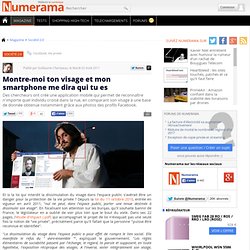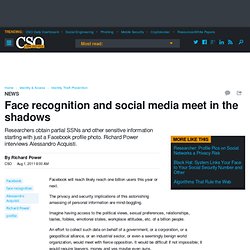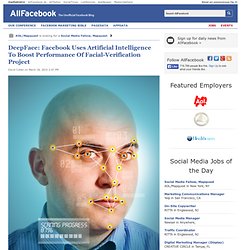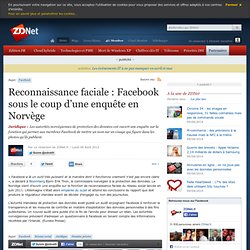

Montre-moi ton visage et mon smartphone me dira qui tu es. Et si la loi qui interdit la dissimulation du visage dans l'espace public s'avérait être un danger pour la protection de la vie privée ?

Depuis la loi du 11 octobre 2010, entrée en vigueur en avril 2011, "nul ne peut, dans l'espace public, porter une tenue destinée à dissimuler son visage". En focalisant son attention sur les burqas, qu'il souhaite bannir de France, le législateur en a oublié de voir plus loin que le bout du voile. Dans ses 22 pages, l'étude d'impact (.pdf) qui accompagnait le projet de loi n'évoquait pas une seule fois la notion de "vie privée", précisément parce qu'il fallait que la personne "puisse être reconnue et identifiée".
"La dissimulation du visage dans l'espace public a pour effet de rompre le lien social. Elle manifeste le refus du " vivre-ensemble "", expliquait le gouvernement. “Minority Report” Scanners Are Coming: Company Receives $15 Million to Develop Long-Range Facial Recognition Technology. They might not light up our eyes, but long-range facial recognition cameras are sure to light up computer databases with our whereabouts, criminal records, possibly even our shopping tendencies.

Ever heard of a company called Digital Signal Corporation? Neither had I. Well, remember the movie “Minority Report,” how cameras everywhere would scan Tom Cruise, instantly recognizing him to either welcome him into the shopping mall or send the cops after him? The same sort of facial recognition technology is exactly what Digital Signal Corporation is into–except these guys are for real. Marketwire recently reported that DSC received $15 million to develop three dimensional long-range biometric facial recognition technology. Hmm, I wonder what exactly DSC’s technology will be used for?
How convenient. Face recognition and social media meet in the shadows. Facebook will reach likely reach one billion users this year or next.

The privacy and security implications of this astonishing amassing of personal information are mind-boggling. Imagine having access to the political views, sexual preferences, relationships, tastes, foibles, emotional states, workplace attitudes, etc. of a billion people. An effort to collect such data on behalf of a government, or a corporation, or a geopolitical alliance, or an industrial sector, or even a seemingly benign world organization, would meet with fierce opposition. It would be difficult if not impossible; it would require lawyers, money and yes maybe even guns.
Also read The 7 deadly sins of social networking security It is all out there now, not just spread all across cyberspace in fragmented segments; no, happily, willfully offered up in an organized way. Consider for example the Facebook profile photo. Indeed. DeepFace: Facebook Uses Artificial Intelligence To Boost Performance Of Facial-Verification Project. An accuracy rate of 97.25 percent is fairly impressive in most cases, and when it comes to facial recognition, DeepFace, a facial-verification software project being developed by Facebook, reached that level, according to a research paper released by the social network last week, which added that human beings shown two unfamiliar photos of faces were able to identify whether or not the subjects were the same person 97.53 percent of the time, barely edging out DeepFace.

MIT Technology Review pointed out that the progress made by DeepFace marks “a significant advance” over previous facial-recognition software, adding that DeepFace has received a boost from Facebook’s emphasis on artificial intelligence. You normally don’t see that sort of improvement. We closely approach human performance.
Germany ask FB to destroy database. Reconnaissance faciale : Facebook sous le coup d’une enquête en Norvège. « Facebook a là un outil très puissant et la manière dont il fonctionne vraiment n’est pas encore claire », a déclaré à Bloomberg Bjorn Erik Thon, le commissaire norvégien à la protection des données.

La Norvège vient d’ouvrir une enquête sur la fonction de reconnaissance faciale du réseau social lancée en juin 2011. L’Allemagne s’était alors emparée du sujet et attend les conclusions du rapport que doit produire le régulateur irlandais avant de décider d’engager ou non des poursuites. L’autorité irlandaise de protection des données avait publié un audit enjoignant Facebook à renforcer la transparence et les mesures de contrôle en matière d’exploitation des données personnelles à des fins publicitaires. Un nouvel audit sera publié d’ici la fin de l’année pour dresser un bilan. Les autorités norvégiennes prévoient d’adresser un questionnaire à Facebook en tenant compte des informations récoltées par l’Irlande.
Latest Rumored Facebook Acquisition Target: Face.com. A camera to identify FB users. Facebook Eyes Facial Recognition Firm for Purchase, Report. With Instagram in the fold and Opera in its sights, will Face.com be the next big acquisition for newly minted public company Facebook?

Face.com is an Israeli company known for its "best in breed" facial recognition technology. When you're launching the kind of offensive that Facebook's mounting in the photosphere, it only makes sense to have top-shelf mug finding technology, like Face.com. Moreover, Face.com has started peddling its wares in the mobile world—a world that's a top priority at Facebook right now—with an iOS app called KliK, which allows people to "tag" their friends in real time. Face.com already makes a facial recognition app for Facebook called Photos Tagger, which allows members to scan photo albums on the social network for faces of "friends" and its API is used by the social network in its existing facial recognition scheme. According to The Next Web, Face.com CEO Gil Hirsch is being laconic on the acquisition rumor, saying "nothing new to share. "